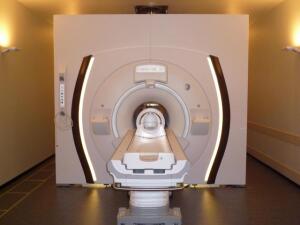by
Brendon Nafziger, DOTmed News Associate Editor | November 04, 2011

GE's 7-T MRI (Courtesy GE Healthcare)
An experimental, high-field magnetic resonance imaging unit could help provide new ways to scan the brain by illuminating electrical discharges or even gauging the brain's pH. And it's coming soon to a future Iowa research facility.
On Tuesday, GE Healthcare said it beat out two rivals to land a contract at the University of Iowa Health Care's soon-to-be-built biomedical research center for an investigational 7-Tesla MRI scanner.
The device is being paid for by a National Institutes of Health grant received by Dr. Vincent Magnotta, an MRI researcher who specializes in neuro-radiology at the Iowa City hospital and will work with the equipment when the Pappajohn Biomedical Discovery Institute is finished in 2013.



Ad Statistics
Times Displayed: 53067
Times Visited: 4357 MIT labs, experts in Multi-Vendor component level repair of: MRI Coils, RF amplifiers, Gradient Amplifiers Contrast Media Injectors. System repairs, sub-assembly repairs, component level repairs, refurbish/calibrate. info@mitlabsusa.com/+1 (305) 470-8013
Better resolution
Only a handful of 7-T MRIs are in use at research centers, and none has been cleared by the Food and Drug Administration for routine clinical scanning. A few companies, including Royal Philips Electronics and Siemens, make them, and have installed perhaps a few dozen at labs around the world.
GE spokeswoman Rebecca Hayne said she couldn't share specifics about how many units the company has sold, but she mentioned Waukesha, Wis.-based GE Healthcare has installed systems at Stanford University in Palo Alto, Calif., University of California, San Francisco, Medical College of Wisconsin in Milwaukee, and in Italy and Japan.
Although clinical work is still in the early stages, 7-T MRI offers a theoretical benefit over weaker magnets: better resolution.
"It's going to give you higher resolution, that's the immediate benefit, and a higher signal-to-noise ratio," Magnotta told DOTmed News.
Brain research
Neurology is one of the most promising fields for the high-powered magnetic technology, and in 2010, researchers published an atlas of the brain using 7-T MRI scans. In fact, Magnotta estimates about 75 percent of work on the 7-T MRI at the new center will be in neuroscience and psychiatry, and the other 25 percent in orthopedics.
One area in brain imaging where 7-T could be especially useful is in functional magnetic resonance imaging.
Currently, functional MRI scans let doctors understand activity in the brain by showing blood flow to different regions. But with more powerful magnets, researchers might be able to directly assess the electrical activity in firing neurons, Magnotta said.
"As you get a higher signal-to-noise ratio it should be theoretically be possible to more robustly measure that signal change," he said.
Sodium imaging

